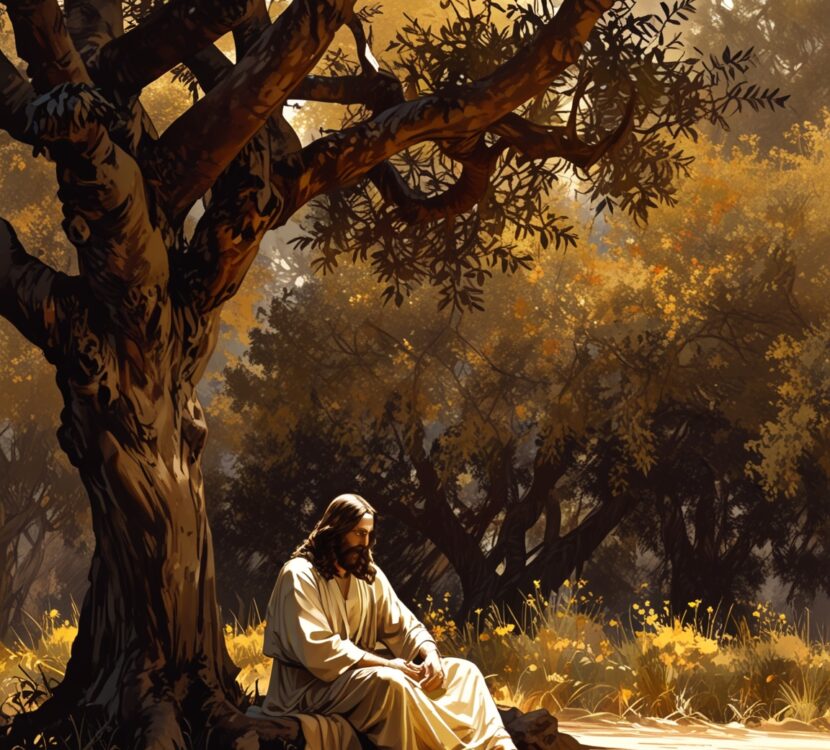The Garden of Gethsemane
He prayed more fervently, and he was in such agony of spirit that his sweat fell to the ground like great drops of blood. Luke 22:44, NLT Ah, beloved brothers and sisters in Christ, grace and peace be multiplied to you. As we draw ever closer to the sacred remembrance of Good Friday and the

He prayed more fervently, and he was in such agony of spirit that his sweat fell to the ground like great drops of blood.
Luke 22:44, NLT
Ah, beloved brothers and sisters in Christ, grace and peace be multiplied to you. As we draw ever closer to the sacred remembrance of Good Friday and the glorious dawn of Easter Sunday, our hearts turn with profound reverence to the pivotal moments in the life, death, and resurrection of our Lord and Savior, Jesus Christ. The passage we’ve just reflected upon, though concise, holds within its depths a universe of meaning, a powerful testament to God’s unwavering love and His transformative power in our lives. Let us, together, prayerfully unpack these profound truths, allowing the Holy Spirit to illuminate our understanding and stir our hearts anew.
The narrative begins with Jesus, in the shadow of His impending crucifixion, retreating to a place steeped in symbolic significance: the Garden of Gethsemane. The very name, “Gethsemane,” resonates deeply with the trials that were about to unfold. It translates literally to “the place of pressing,” a detail that is far from coincidental. In ancient times, this grove of olive trees would have been the site where olives were crushed and pressed to yield their precious oil. This image, so intimately tied to the garden’s name, serves as a powerful metaphor for the immense pressure that Jesus Himself was about to endure.
Consider the process of extracting olive oil. It requires a force, a weight, a crushing that seems destructive to the fruit itself. Yet, it is through this very process of being broken and pressed that the valuable oil, essential for light, for healing, for anointing, is released. In the same way, the weight of the world’s sin, the burden of our transgressions, began to press down upon Jesus in that sacred space. He knew the excruciating physical suffering that awaited Him, the humiliation, the abandonment, and the spiritual anguish of being separated from His Father.
The Gospel accounts reveal the depth of Jesus’ agony in Gethsemane. Luke, in his Gospel, describes it with stark detail: “And being in agony, He prayed more earnestly. Then His sweat became like great drops of blood falling down to the ground” (Luke 22:44,1 NKJV). This physiological manifestation of His profound distress speaks volumes about the immense spiritual and emotional battle He was waging. It wasn’t merely the fear of physical pain; it was the weight of sin, the anticipation of bearing God’s wrath on our behalf, that caused such an intense internal struggle. This was the “pressing” in its most profound sense, a spiritual crushing under the burden of humanity’s fallen state.
This agonizing prelude in Gethsemane directly leads us to the solemnity of Good Friday. The pressure intensified beyond measure as Jesus was betrayed, arrested, falsely accused, and ultimately nailed to the cross. The cross, an instrument of brutal torture and public shame, became the very symbol of His sacrifice. Every lash, every nail, every moment hanging between heaven and earth was a testament to the incredible pressure He willingly endured. This was not a random act of violence; it was the culmination of God’s redemptive plan, the just punishment for our sins being poured out upon His perfect Son.
The narrative doesn’t end there, praise be to God! The passage then speaks of Saturday, a day often overlooked in the dramatic arc of Holy Week. Jesus lay in the tomb, seemingly defeated, restricted by the cold grip of death. From a human perspective, it appeared as though darkness had prevailed. The forces of evil might have rejoiced, believing they had silenced the Light of the world. Yet, even in this stillness, God’s plan was unfolding. The grave, meant to be a place of finality, became the stage for the ultimate triumph.
Then, on that glorious Sunday morning, the earth shook, the stone was rolled away, and Jesus Christ, our Lord and Savior, rose triumphantly from the dead! The power of sin and death, the very forces that held humanity captive, were shattered. The grave could not hold Him! His resurrection is the cornerstone of our faith, the undeniable proof of His divinity and the promise of our own future resurrection. As the passage rightly declares, the great enemy of death could not hold Him down, and He lives and reigns forevermore!
Now, let us delve deeper into the profound message that emerges from this sequence of events, the powerful truth that “God uses our enemies to bless us.” This might seem counterintuitive, even paradoxical, but it is a principle woven throughout the fabric of Scripture and the tapestry of our own lives.
Think about it: the very instruments of Jesus’ suffering – the betrayal of Judas, the injustice of the Sanhedrin, the cruelty of the Roman soldiers, the agony of the cross itself – were all part of God’s sovereign plan to bring about our salvation. What appeared to be acts of malice and defeat were, in fact, the very means by which God demonstrated His boundless love and secured our redemption.
This principle extends to our own lives as followers of Christ. The pressures we face, the trials we endure, the obstacles that seem insurmountable – these are not necessarily signs of God’s displeasure or abandonment. Instead, they can be the very “pressing” that God uses to release the “treasure” He has placed within us.
Consider the analogy of a seed. It must be buried in the darkness, subjected to the pressure of the soil, before it can sprout and grow into a fruitful plant. In the same way, we often find that it is in our times of greatest difficulty, when we are pressed beyond our comfort zone, that our faith is stretched, our character is refined, and our reliance on God deepens.
The passage wisely states, “If you’re never put under pressure, if you never have to stretch your faith, endure, overcome, and persevere, you won’t tap into the treasures God put inside.” What are these treasures? They are manifold: deeper intimacy with God, a stronger reliance on His strength, a greater capacity for compassion and empathy, the development of spiritual resilience, and the unveiling of gifts and talents we never knew we possessed.
Think of the times in your own life when you faced significant challenges. Perhaps it was a financial hardship, a relational conflict, a health crisis, or a period of intense spiritual struggle. In those moments, did you not find yourself crying out to God in a way you never had before? Did you not discover a strength within you that you didn’t know existed? Did you not learn valuable lessons about God’s faithfulness and your own dependence on Him? These are the treasures that are often unearthed through the “pressing” of life.
The call to “stay in faith” is crucial amidst these trials. It is in these moments that the enemy would seek to sow seeds of doubt, fear, and despair. He would whisper lies, suggesting that God has abandoned us or that our situation is hopeless. But as followers of Christ, we are called to stand firm in our belief in God’s unfailing love and His sovereign control. We must remember the ultimate victory won on that glorious Sunday morning.
The final affirmation, “God won’t allow the pressure if it’s not going to work for your good,” is a powerful reminder of God’s loving intention behind the trials we face. This does not mean that God orchestrates evil or delights in our suffering. Rather, it means that even in the midst of difficult circumstances, God is at work, weaving together all things for the good of those who love Him and are called according to His purpose (Romans 8:28). He can take the very things meant to harm us and transform them into opportunities for growth, for blessing, and for the advancement of His Kingdom.
This understanding should not lead us to seek out suffering or to minimize the pain we experience. Jesus Himself prayed earnestly in Gethsemane for the cup of suffering to pass from Him. But it should give us a perspective of hope and resilience when trials inevitably come. We can trust that God is with us in the midst of the pressing, that He will never leave us nor forsake us (Hebrews 13:5), and that He has a purpose even in our pain.
As we contemplate these profound truths during this Holy Week, let us not simply observe the historical events from a distance. Let us allow the reality of Jesus’ sacrifice and His glorious resurrection to penetrate the depths of our hearts. Let us examine our own lives and consider the “pressing” we may be experiencing. Are we allowing these challenges to draw us closer to God, to stretch our faith, and to reveal the treasures He has placed within us? Or are we succumbing to fear and despair?
The message of Easter is one of ultimate hope and transformation. Just as the olive, when pressed, yields its precious oil, so too can we, through the pressures of life, yield the fruit of the Spirit: love, joy, peace, patience, kindness, goodness, faithfulness, gentleness, and self-control (Galatians 5:22-23). These are3 the true treasures that God desires to cultivate within us.
Therefore, beloved in Christ, as we journey through this Holy Week, let us fix our eyes on Jesus, the author and finisher of our faith (Hebrews 12:2). Let us remember the agony of Gethsemane, the sacrifice of Good Friday, and the triumph of Easter Sunday. And let us embrace the truth that even in our darkest moments, God is at work, using the pressures of life to bring forth His glory and our ultimate good.
In this spirit of seeking deeper understanding and drawing closer to the heart of God’s Word, I encourage you to Explore Moralisee.com’s daily devotions. There, you will find further reflections, prayers, and insights to guide you through this sacred season. Allow the Holy Spirit to illuminate your path as you meditate on the profound love and sacrifice of our Savior. May this Easter season be a time of deep spiritual growth, renewed hope, and a fresh encounter with the living Christ. Amen.


















